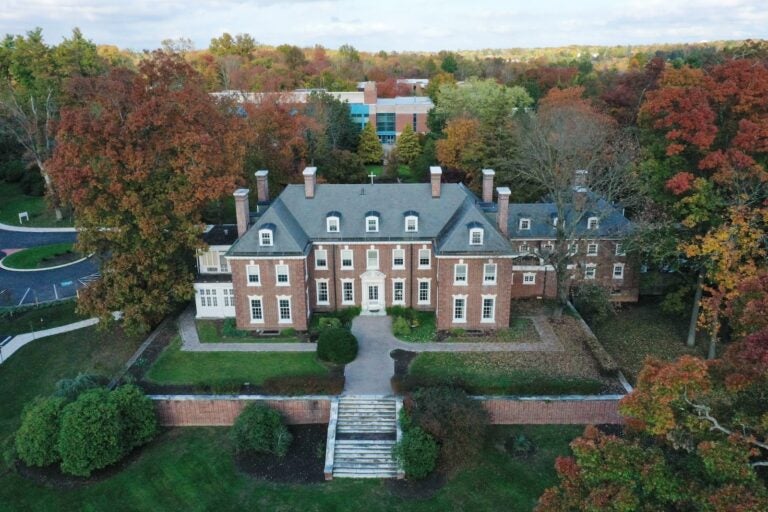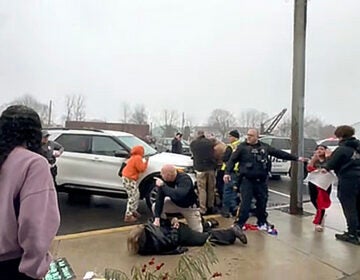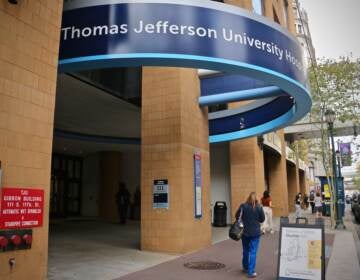Gwynedd Mercy initiative seeks to address health care worker shortage with accelerated training courses
Worker shortage leads to strain on care access, industry experts say.
Listen 1:19
Gwynedd Mercy University in Lower Gwynedd Twp., Bucks County. (AP/Business Wire)
From Philly and the Pa. suburbs to South Jersey and Delaware, what would you like WHYY News to cover? Let us know!
Gwynedd Mercy University has created a new initiative to address the shortage of nurses and other health care workers. The program aims to train much-needed employees, offer affordability for students and focus on innovation.
The initiative, called the Compassionate Care Collaborative, is designed to build a pipeline for in-demand health care jobs, such as nurses and respiratory therapists. The program will focus on collaborating with employers and fostering innovation through utilizing technology like artificial intelligence to improve the patient experience and advance health equity, said Deanne D’Emilio, president of Gwynedd Mercy.
It will be housed in the school’s $23 million, 63,000-square-foot Frances M. Maguire Healthcare Innovation Center, which is scheduled for completion in August. It is named for the 1955 graduate of the university, whose Maguire Foundation donated the $10 million lead gift for the building.
“This is a new initiative for Gwynedd Mercy and it really builds on our historic strength in healthcare education that we’ve been doing for almost 70 years,” D’Emilio said.
The Sisters of Mercy, who founded the university in 1948 in Montgomery County, have always sought to meet societal needs, she said, and this program is no different.
Gwynedd Mercy already offers several accelerated programs for nursing, but now it will also consult with health care systems to determine what needs they have and will tailor degrees or certificates. For example, some existing health care workers might seek certificates, in areas such as project management or leadership, to advance their careers.
It will also offer extensive mentoring and internships to supplement education and training.
“We want to focus on the latest in health care and addressing the best patient outcomes that we possibly can,” D’Emilio said. “What is the latest innovation?”
When completed, Gwynedd Mercy’s Healthcare Innovation Center will be the largest academic building space on campus, big enough to offer collaboration between health care and related majors, such as computer science, psychology and social work.
“The students will get to work in interprofessional teams,” D’Emilio said, much like they would in a live medical setting.
The center will include the latest technology used in the medical profession, such as simulated manikins with interchangeable parts; a 3D interactive, virtual physiological dissection platform called an Anatomage table; a simulated radiation therapy system known as a Virtual Environment for Radiotherapy Teaching and a lung simulator that can replicate many different lung conditions. It will also include nine skills labs and 15 high-tech situation rooms.
In addition, the initiative will also focus on affordability, since most of its students receive some type of financial aid.
In March, Gwynedd Mercy announced that it was expanding its Nursing Scholars Program, which offers up to $40,000 in loan forgiveness for students who agree to work for at least three years at Geisinger Health System, which includes Temple Health, Penn Hyland Health and WellSpan Health. Since then, Lehigh Valley Health Network has joined the program.
All of this is designed to speed up the pipeline for in-demand health care jobs, along with expanded accelerated degrees, online and hybrid options.
Since 2019, Gwynedd Mercy has graduated 1,400 nurses and about 900 allied health professionals.
An industry survey of hospitals and nursing homes in Pennsylvania conducted in April revealed vacancy rates for registered nurses of 19%, respiratory therapists at 19% and surgical technicians at 28%. The survey was conducted by the Hospital and Healthsystem Association, LeadingAge PA and the Pennsylvania Health Care Association.
High turnover and other issues mean there are not enough health care professionals to support the state’s increasing senior population, industry observers say, leading to strains on access to care.
In March, Pennsylvania Gov. Josh Shapiro and Nancy Walker, the state secretary of labor and industry, visited Temple University Health System’s Temple Women & Families program to highlight a proposed $5 million investment to create the Nurse Shortage Assistance Program.
At the time, Shapiro said the state must “take action now,” to address the nursing shortage. He has proposed several steps to do so, including:
- The expansion of nursing apprenticeships
- Expanding college loan repayment programs
- Increasing funding for educating and training nursing professionals
Meanwhile, another college is linking up with a health care system to help advance its students’ careers.
This week, Community College of Philadelphia announced a partnership with Prime Healthcare Pennsylvania Region to help improve education and career opportunities for its health care students.
Under the agreement, CCP students — including those studying to be nurses, medical assistants, pharmacy techs, respiratory care technicians and others — will be eligible to join field education rotations at Prime Healthcare state facilities, including Lower Bucks Hospital and Roxborough Memorial Hospital.
The company will work with CCP’s career advisors to recruit students.
“This partnership represents a pivotal moment for the college as we join forces with a leading health system like Prime Healthcare,” CCP interim president Alycia Marshall said in a statement. “Our healthcare education programs have long been recognized for their academic excellence and industry relevance.”

Get daily updates from WHYY News!
WHYY is your source for fact-based, in-depth journalism and information. As a nonprofit organization, we rely on financial support from readers like you. Please give today.







